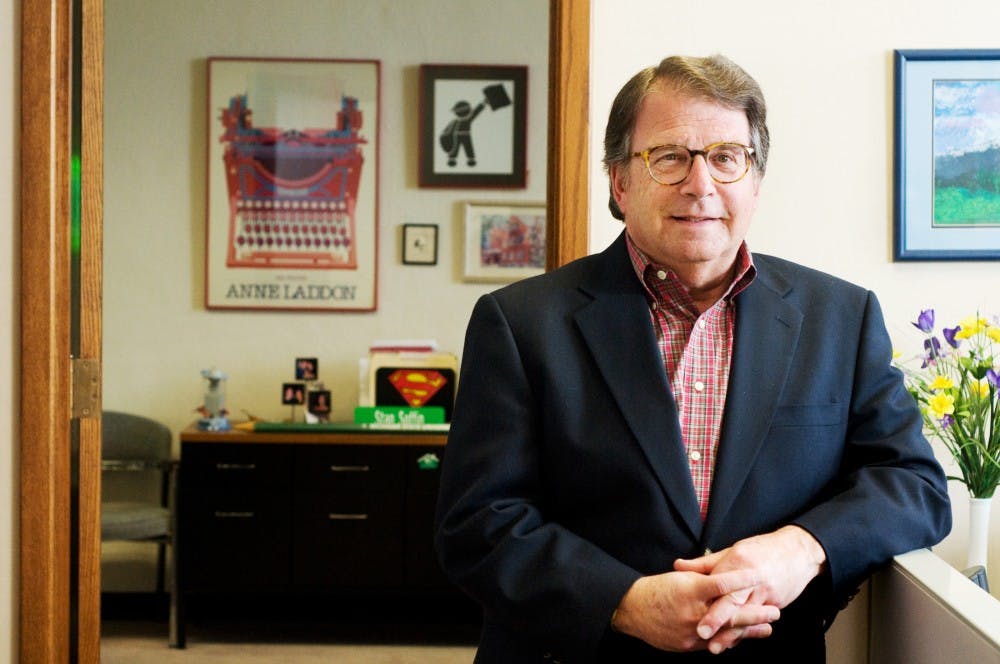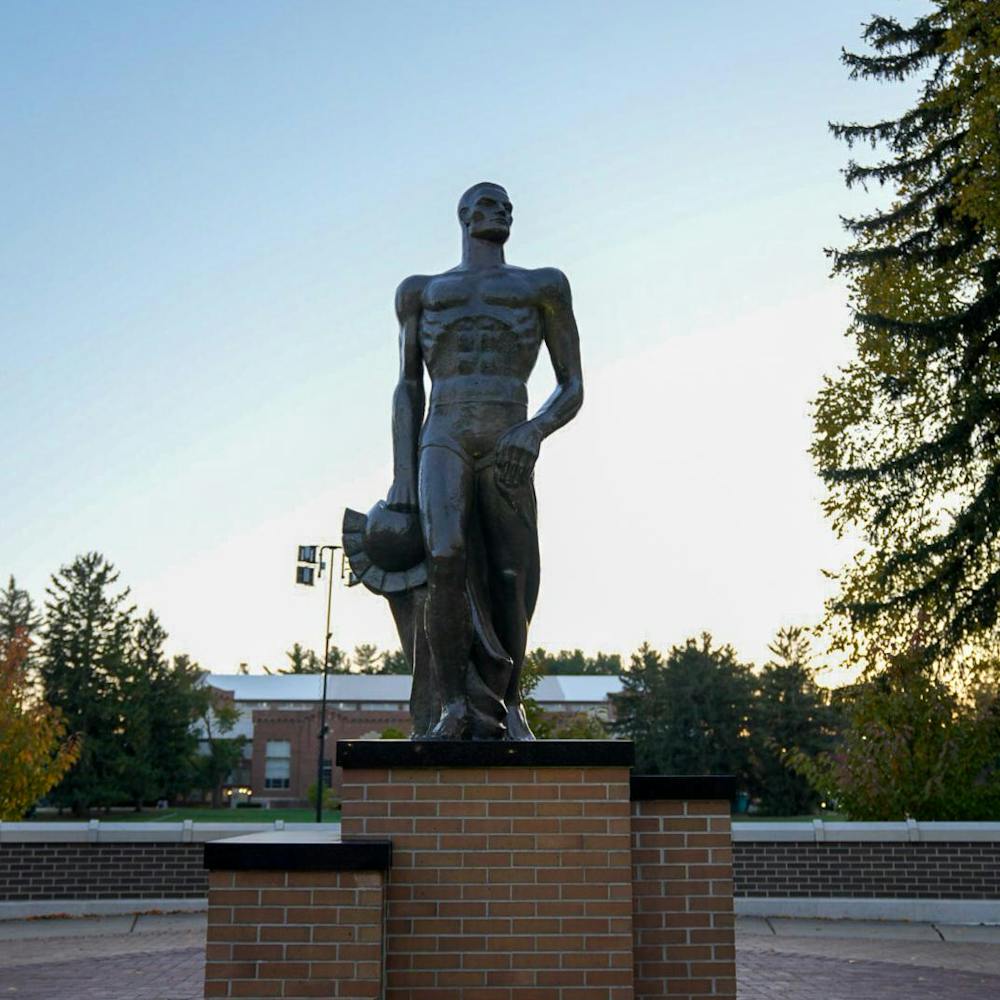Ask MSU faculty about MSU Ombudsman Stan Soffin, and one will hear almost nothing but praise.
“Dr. Soffin is, in my estimation, an extremely valuable component or individual at MSU,” said Doug Estry, the associate provost for undergraduate education who’s worked with Soffin closely through the years. “He is informed, he is knowledgeable, he appreciates and advocates both for the rights of the student as well as the rights and responsibilities of the faculty — he is truly the definition of what an ombudsman should be.”
For about 13 years, Soffin has served the MSU community in that capacity, dealing with issues regarding academic integrity, student and faculty concerns and the proper interpretation of rules and regulations on behalf of faculty and students alike.
Soffin’s work at MSU goes beyond his service as ombudsman. Prior to his appointment to the post in 1998, he had served the MSU community in various capacities since the mid-1960s.
Now, after more than 40 years of work as a Spartan, Soffin will retire from ombudsman this summer.
“I’m very sorry to see he’s stepping down,” Estry said. “He’s an outstanding example of faculty that commit to the university.”
Becoming a Spartan
A 1960 graduate of Owosso High School, Soffin first arrived at MSU in the summer of 1965 after attending the University of Michigan, where he earned his undergraduate degree in journalism.
At the time, Soffin taught high school English and journalism courses in California and decided to return to Michigan to update his teaching certification. He chose to live in Owosso, Mich., during the summers and take courses at MSU while teaching in California during the school year, a practice he continued for three years.
“It was convenient,” Soffin said. “The journalism program here had good faculty.”
After taking a full year of classes from 1967-68 while teaching in the now-defunct Justin Morrill College, Soffin earned his master’s degree in journalism and joined the MSU staff as an instructor following another faculty member’s departure for Indiana State University.
Early on in his time at teaching at MSU, students began to take notice of him.
Karen Dunlap, the president of The Poynter Institute and a former student of Soffin’s, said there were several characteristics that stood out about the instructor.
“I think he was the youngest teacher of the faculty, and there was this sort of natural attraction,” she said. “He was very approachable, and yet he was passionate about the topic (he was teaching).”
While continuing to teach, Soffin earned his doctorate in American studies at the recommendation of then-MSU School of Journalism Director Fred Siebert.
“(He) said that if I wanted to continue to teach here, I would need to get a Ph.D.” Soffin said.
The move helped Soffin remain in the department and later become the director of the School of Journalism in 1982, something he said he had no idea would happen.
“You start your career in 1968, and you don’t think you’re going to be the director of the School of Journalism by any means,” he said.
Moving on up
Upon his appointment as director of the MSU School of Journalism, Soffin brought the Michigan Interscholastic Press Association, or MIPA, to MSU after the chair of Central Michigan University’s journalism department told Soffin they would be unable to handle the responsibility any longer.
The organization now provides both representation and education for high school journalists, teachers and advisers as well as summer workshops hosted at MSU.
That move was just one of the projects he led that helped improve the School of Journalism, said Cheryl Pell, a senior faculty specialist and the executive director of MIPA.
Support student media!
Please consider donating to The State News and help fund the future of journalism.
“He made a lot of outside contacts with news agencies and with the professional press,” she said.
“He got people looking at us and seeing the things we were doing — he was personable.”
Soffin also sought to bring back the Michigan Newspaper Hall of Fame in 1985, which had been inactive since 1968.
He later turned the program into the Michigan Journalism Hall of Fame and served as its director for 13 years. Soffin was inducted into the institution in 1999 and also became a member of the State News Alumni Association Hall of Fame in 2010.
Stephen Lacy, the associate dean for graduate studies in the College of Communication Arts and Sciences and a professor in the School of Journalism, said Soffin stood out as a leader in the school.
“He was a great director of the (School of Journalism),” he said. “In the 100 years of the (school), there were three (directors) that really affected the school — he took what was a very strong regional program and turned it into a very strong national program.”
After 16 years as the director of the school, Soffin’s climb up the administrative ladder continued in a big way.
A new era
In 1998, Soffin accepted his most significant promotion yet, stepping up to fill the role left behind by Ombudsman Joy Curtis’ retirement.
Soffin’s skill at mediating disputes already was on display throughout his tenure as director of the School of Journalism.
“I cannot recall a time when the faculty was split after an issue. Through Stan’s efforts, if we had differences of opinion, we’d talk about it some more, (and) pretty soon the issue would have an overwhelming majority,” said Lucinda Davenport, director of the School of Journalism.
“That’s a difficult skill to have.”
Soffin previously had interacted with the ombudsman during his time as director of the School of Journalism, when both the school’s offices and the ombudsman’s department were housed in Linton Hall.
Soffin said he sometimes would stop by the ombudsman’s office but didn’t believe he one day might fill that role.
“It never dawned on me that I would ever be the ombudsman,” he said.
Leaving a legacy
Soffin officially will retire on Aug. 15, and although a search for his replacement hasn’t started, Soffin’s impending retirement has led many faculty and former students to reflect on
his accomplishments at MSU.
L.A. Dickerson, a specialist in the School of Journalism, offered high praise when asked about Soffin — she knew him as a student during the late 1970s.
“I don’t think I’ve ever known anybody who’s known so many people on campus,” she said. “Everybody thinks the same thing about Stan — he’s simply one of the greatest guys who’s ever lived in the history of time.”
Pell thinks there is one reason in particular why his impact has been so great.
“People are always drawn to people who are ‘doers,’” she said. “(Stan) was a doer.”
Discussion
Share and discuss “Ombudsman to retire after 40 years at MSU” on social media.







